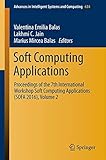Soft Computing Applications [electronic resource] : Proceedings of the 7th International Workshop Soft Computing Applications (SOFA 2016), Volume 2 / edited by Valentina Emilia Balas, Lakhmi C. Jain, Marius Mircea Balas.
Contributor(s): Balas, Valentina Emilia [editor.] | Jain, Lakhmi C [editor.]
| Jain, Lakhmi C [editor.] | Balas, Marius Mircea [editor.]
| Balas, Marius Mircea [editor.] | SpringerLink (Online service)
| SpringerLink (Online service) .
.
Material type:  BookSeries: Advances in Intelligent Systems and Computing: 634Publisher: Cham : Springer International Publishing : Imprint: Springer, 2018Edition: 1st ed. 2018.Description: XXXI, 614 p. 321 illus. online resource.Content type: text Media type: computer Carrier type: online resourceISBN: 9783319625249.Subject(s): Computational intelligence
BookSeries: Advances in Intelligent Systems and Computing: 634Publisher: Cham : Springer International Publishing : Imprint: Springer, 2018Edition: 1st ed. 2018.Description: XXXI, 614 p. 321 illus. online resource.Content type: text Media type: computer Carrier type: online resourceISBN: 9783319625249.Subject(s): Computational intelligenceThese two volumes constitute the Proceedings of the 7th International Workshop on Soft Computing Applications (SOFA 2016), held on 24–26 August 2016 in Arad, Romania. This edition was organized by Aurel Vlaicu University of Arad, Romania, University of Belgrade, Serbia, in conjunction with the Institute of Computer Science, Iasi Branch of the Romanian Academy, IEEE Romanian Section, Romanian Society of Control Engineering and Technical Informatics (SRAIT) - Arad Section, General Association of Engineers in Romania - Arad Section, and BTM Resources Arad. The soft computing concept was introduced by Lotfi Zadeh in 1991 and serves to highlight the emergence of computing methodologies in which the accent is on exploiting the tolerance for im precision and uncertainty to achieve tractability, robustness and lower costs. Soft computing facilitates the combined use of fuzzy logic, neurocomputing, evolutionary computing and probabilistic computing, leading to the concept of hybrid intelligent systems. The rapid emergence of new tools and applications calls for a synergy of scientific and technological disciplines in order to reveal the great potential of soft computing in all domains. The conference papers included in these proceedings, published post-conference, were grouped into the following areas of research: • Methods and Applications in Electrical Engineering <• Knowledge-Based Technologies for Web Applications, Cloud Computing, Security Algorithms and Computer Networks • Biomedical Applications • Image, Text and Signal Processing • Machine Learning and Applications • Business Process Management • Fuzzy Applications, Theory and Fuzzy Control • Computational Intelligence in Education • Soft Computing & Fuzzy Logic in Biometrics (SCFLB) • Soft Computing Algorithms Applied in Economy, Industry and Communication Technology • Modelling and Applications in Textiles The book helps to disseminate advances in selected active research directions in the field of soft computing, along with current issues and applications of related topics. As such, it provides valuable information for professors, researchers and graduate students in the area of soft computing techniques and applications.


There are no comments for this item.